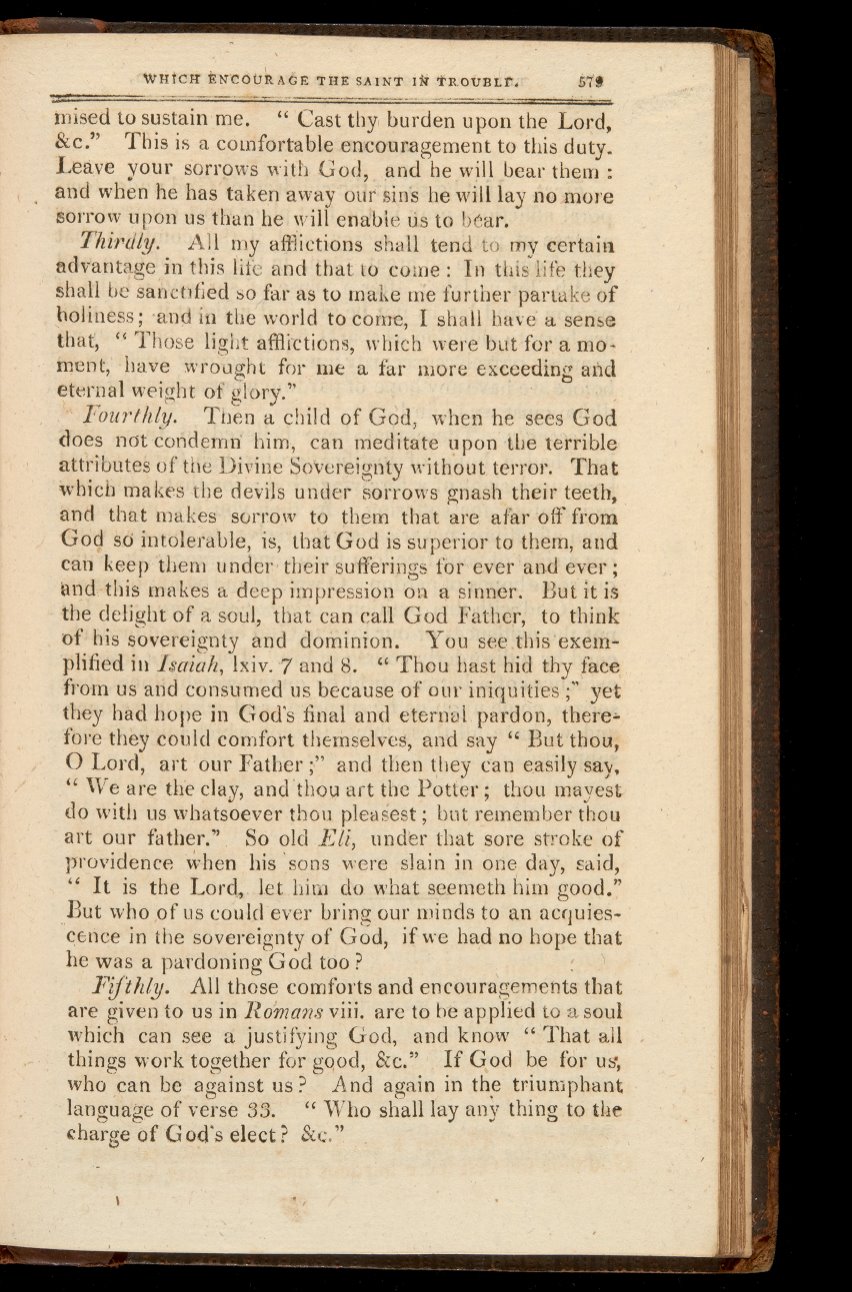

WHICH
ÈNCOÚRAGE THE SAINT IN
TROVBLr.-
579
mised
to sustain
me.
"
Cast thy burden upon the Lord,
&c.,
This
is
a
comfortable encouragement to
this
duty.
Leave your
sorrows
with
God, and
he will
bear
them
:
and
when he has
taken away our
sins he will lay no
more
sorrow upon
us
than
he
will
enable
us to
bear.
Thirdly. All
my
afflictions shall
tend
to
my
certain
advantage
in
this
life
and
that
to
come
:
In
this
life
they
shall
be
sanctified
so
far
as to make
me
further
partake
of
holiness; and
in
the
world
to come, I shall
have
a
sense
that,
"
Those light
afflictions, which
were
but
for
a mo-
ment, have
wrought
for nie a
far more exceeding and
eternal
weight
of
glory."
Fourthly.
Then a
child
of
God, when
he
sees
God
does
not
condemn
him,
can
meditate upon the
terrible
attributes
of
the Divine Sovereignty
without
terror.
That
which
makes the
devils
under
sorrows gnash
their
teeth,
and
that
makes
sorrow
to
them
that
are afar
off from
God
so
intolerable,
is,
that God
is
superior
to them,
and
can
keep them
under
-
their
sufferings
for ever and ever
;
tend
this makes
a
deep impression
on
a
sinner. But it
is
the
delight of
a
soul,
that
can call
God
Father,
to
think
of
his
sovereignty and dominion.
You
see
this
exem-
plified
in
Isaiah,
lxiv. 7
and
8.
" Thou hast
hid
thy face
from
us and
consumed
us
because
of our
iniquities
;'
yet
they had
hope
in
God's
final
and
eternal pardon, there
fore they could comfort themselves, and
say
"
But
thou,
O
Lord,
art
our
Father
;"
and then they
can easily
say,
"
We are
the
clay,
and thou
art
the
Potter
;
thou
mayest
do with
us
whatsoever thou pleasest
;
but remember
thou
art
our father."
So
old
Eli,
under that
sore
stroke
of
providence
when
his sons
were slain
in
one
day, said,
"
It
is
the Lord,. let
him do
what seemeth
him
good."
But
who
of
us
could ever bring our minds
to
an
acquies-
cence
in
the
sovereignty
of
God, if
we
had no hope
that
he was
a pardoning God
too
?
I%
thly.
All
those comforts
and encouragements
that
are
given
to
us
in
Romans
viii.
are
to
he
applied
to
a
soul
which can
see
a
justifying God, and
know
" That
all
things work
together
for good, &c."
If
God
be
for
us,
who
can
be
against
us
?
And again
in
the
triumphant
language
of
verse
33.
"
Who
shall
lay
any thing
to
the
charge
of God's
elect
?
&c."

















